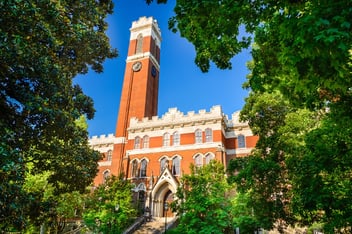
In fields from mathematics to sociology, it is through research that we develop innovative solutions to our society's more pressing challenges — and the engineering field is no different.
Research, specifically in the field of engineering, is crucial to perpetuate progress and ultimately, to better humankind.
At Vanderbilt University School of Engineering, research is a focal point of our community. Research opportunities within the School of Engineering allow students to pursue in-depth study of real-world, tangible topics that range from asset management to infrastructure evaluation.
We focus on grand engineering challenges that leverage our multidisciplinary and collaborative culture, and we demonstrate the value of impactful research through our investment in collaborative centers, institutes and facilities. Such investment creates a portfolio of contributions spanning the range from the discoveries of basic research to the solutions of applied research.
How Vanderbilt engineering research is saving lives:
The field experts teaching and researching at Vanderbilt School of Engineering have a variety of research focuses. Below are three specific examples of leading minds in engineering research and their work.
Vanderbilt Researcher
Sanjiv Gokhale, Ph.D., Director of Graduate Studies in Construction Management
Research Initiative
Repair, rehabilitation and renewal of underground infrastructure
Due to their low visibility, rehabilitation of underground pipelines is frequently neglected until a catastrophic failure occurs. Professor Gokhale's research focuses on the testing and assessment of minimally invasive technologies for pipeline condition assessment, repair and rehabilitation.
Professor Gokhale has also made significant contributions in the development of a framework for a multi-attribute model that addresses the various objectives in underground infrastructure asset management, through a life-cycle cost approach. The model provides the basis for decision-making for asset managers in short-term and long-term infrastructure maintenance and rehabilitation planning within the budgetary constraints. This research initiative directly contributes to the longevity of infrastructure and to the safety of those working in this high-risk environment.
Learn more about how you can jumpstart your career in construction management in our blog, How to Become a Construction Manager by 2025.
Vanderbilt Researcher
Sankaran Mahadevan, Ph.D., John R. Murray Sr. Professor of Engineering
Research Initiative
Risk management and transportation safety
Professor Mahadevan’s research and teaching interests are in uncertainty quantification, risk and reliability analysis, machine learning, system diagnosis and prognosis, and decision-making under uncertainty. He has applied these methods to a variety of structures, materials and systems in civil, mechanical and aerospace engineering.
Professor Mahadevan led a group of Vanderbilt researchers in a $10 million, five-year project sponsored by NASA’s Aeronautics University Leadership Initiative to integrate complex data sources that will be the future of air traffic management systems.
The objective is to develop analysis methods that can help improve aviation safety and support real-time decision-making so that unsafe events can be caught early and prevented from evolving to major incidents.
Discover more about the marvels of risk engineering in our interactive resource, The Future of Risk Analysis, Risk Engineering, and Risk Management: Machine Learning, Uncertainty Analysis, and Digital Twins.
Vanderbilt Researcher
Abhishek Dubey, Ph.D., Assistant Professor of Computer Science and Computer Engineering
Research Initiative
Cyber-physical systems and smart cities
Professor Dubey's broad research interest lies in the resilient system design of cyber-physical systems and in performance management, online failure detection, isolation and recovery in smart and connected cyber-physical systems, with a focus on transportation networks and smart grid.
Specifically focused on smart cities, Professor Dubey’s research first started with a real-time bus application aimed at making that mode of travel easy and rewarding. Now, he and his team are expanding into apps for a host of other uses that create smart cities, with the goal of making our lives safer and more efficient.
9 Vanderbilt Engineering Strategic Research Areas:
These are just three examples of noteworthy research initiatives happening within the School of Engineering. Below are the nine intellectual research areas of distinction where the School of Engineering invests significant resources.
|
Restoring lost physical and cognitive function |
Replacing, engineering and healing damaged tissues and organs |
Biomedical Imaging and Biophotonics Using physical phenomena to diagnose and treat disease |
|
Designing technology, methods and tools to improve patient outcomes |
Nanoscience and Nanotechnology Applying the science and engineering of materials and processes at the nanoscale |
Enabling sustainable resource and energy conservation production and recovery |
|
Risk, Reliability and Resilience Improving predictability of systems, infrastructure and materials |
Big Data Science and Engineering Harvesting and using knowledge from collections of big data sets |
Integrating software and hardware using multidisciplinary approaches |
We seek to positively impact the world through our engineering research.
Vanderbilt’s engineering community impacts the Nashville community, the state of Tennessee, the United States and the global community through our world-class research in engineering enterprise.
We hope you take a moment to explore the variety of graduate engineering programs we offer at Vanderbilt School of Engineering. Or, if you are ready to take the first step in securing a lifelong, successful career in the field of engineering, we invite you to request more information or start your online application today.






